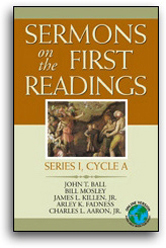SermonStudio
Saved (Again)!
Sermon
Sermons On The First Readings
Series I, Cycle A
Lawrence Henry was 88 years of age when he shared with his family the only sermon he ever preached. Lawrence was a farmer born in 1900 in the Coteau Hills of South Dakota. He received an eighth grade education, raised four children, and died in 1996.
The sermon is titled, "Saved." Here are two key stories in Lawrence's own words:
The sermon is titled, "Saved." Here are two key stories in Lawrence's own words:


